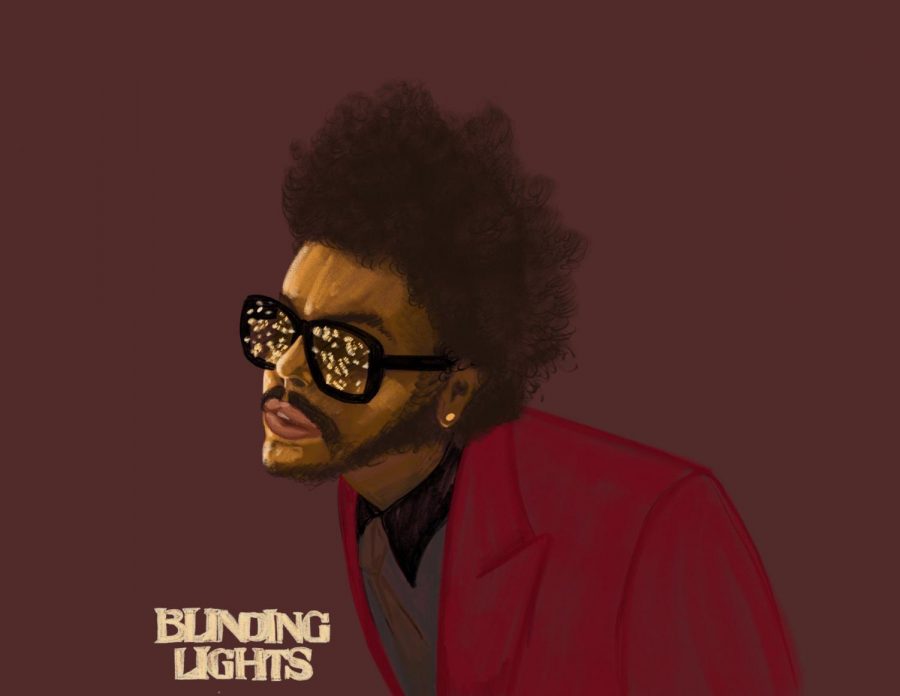The Weeknd Returns to Hopeless, Loveless Hedonism on ‘After Hours’
(The Weeknd released his new album “After Hours” on March 20 | Cartoon by Isabelle Schlegel )
March 21, 2020
Since Abel Tesfaye emerged as The Weeknd in 2011 with his moody and mesmerizing mixtape “House of Balloons,” he’s kept listeners on their toes, intentionally or not, dividing his career into chapters marked by each album’s distinctive sounds and aesthetics. He’s released three lo-fi R&B mixtapes, smashing pop hits like “Can’t Feel My Face” and the Daft Punk-assisted “Starboy” in 2016. On his fourth studio album, “After Hours,” The Weeknd has returned to his early roots — the dark, smoky atmospheres, fragile falsettos and quiet confessions. It’s as if he’s spent the last four years scouring the underground music scene, creating complex synth rhythms to support his lo-fi R&B style to make his balladry feel thrilling, alive and hedonistic again.
“After Hours”
The Weeknd has launched his next era with “After Hours,” his most self-realized album yet. While his early blend of soulful R&B and lyrical tropes about unfulfilling drug-use and sex were fresh on his trilogy of mixtapes in 2011, his 2013 label debut “Kiss Land” proved to be a disappointment. The newness of his self-loathing lyrics and cutting beats had grown stale. A new approach was in order for The Weeknd with an ambitious pivot on the 2015 album “Beauty Behind the Madness” garnering massive commercial success. He showed his versatility by proving he could survive in the mainstream realm by incorporating a brightened sound and less overtly profound lyrics.
He carried this strategy into his 2016 album “Starboy” — a glossy, disco-funk effort boasting collaborations with Kendrick Lamar, Future, Daft Punk and Lana Del Rey. “Starboy” solidified Tesfaye as a global superstar and shot him into uncharted territory sonically.
On “Starboy,” he ventured into the ‘80s realm, sampling The Romantics and Tears for Fears on one track. But with “After Hours” The Weeknd has recorded an almost entirely ‘80s R&B dream album. Sonically, “After Hours” features electronic keyboards, flourishing synths and punchy — often dark — bass lines. It’s distinctively a Weeknd sounding album, with a suite of songs showing remorse for a failed relationship — one that seemed doomed from the start — and offering hints of self-reflection along the way.
Track By Track
The album has 14 tracks and runs 62 minutes long, beginning with gentler, quieter songs. The Weeknd sets the mood for “After Hours” with the haunting tracks “Alone Again” and “Too Late” — loaded with ominous keyboards and bass — before shifting into the achingly painful “Hardest To Love.”
It’s followed by “Scared To Live,” a slow-burning ballad that has The Weeknd apologizing for mistakes he made in his past relationship. Next up is the autobiographical “Snowchild” — featuring lyrical memories from the singers’ upbringing in Toronto, Canada, and his come up in the music industry.
Roughly 25 minutes into the album, the vibe changes and the bangers are introduced — starting with “Heartless,” a dark, bass-heavy Metro Boomin-produced track that has The Weeknd leaning into the toxic side of his persona. He makes it immediately clear where his head is at with the blunt opening line, “Never need a b—-, I’m what a b—- need.”
His hedonism continues in “Blinding Lights” — a track packed with layers of luminous synth textures and trembling hooks that are unmistakably ‘80s-sounding. The Weeknd rounds out his ‘80s saga with “In Your Eyes” and “Save Your Tears,” both featuring groovy electro-keyboard synths that are destined to become hits.
The good times and upbeat melodies soon end as the ominous atmosphere looms over the final two tracks, “After Hours” — a track with heavy, pulsating beats and desperate lyrics — and “Until I Bleed Out.” The abrupt, distorted ending of “Until I Bleed Out” suggests an unhappy ending for The Weeknd.
The Verdict
On “After Hours,” The Weeknd’s vision is clear — he’s crafted a cohesive album and visuals with a real narrative arc. The songs bleed together in an effortless precision with sonic references tying any unraveling threads together in the end. “After Hours” is a balance of the beauty and the madness that consume The Weeknd.
5/5 Stars








